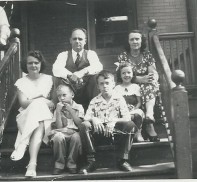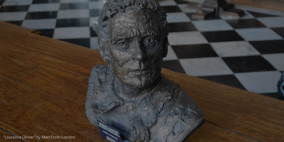Hobos in a Clearing in Wyoming
We reached the crest of the hill at dusk.
Below us like the camps of infantry
Burned the scattered fires of forgotten men,
Each a separate picture.
They lived in the open or in
The opulence of tarpaper lean-tos against a tree
And migrated as punctually as geese.
They wore black–perhaps it was the soot of freight trains–
And squatted on their haunches like crickets
Beside the snapping flames.
Cicadas chirped in the grass.
Streams of smoke trailed off high into the trees.
Embers flickered and faded, flickered and faded
In the harsh bite and sparkle of a sudden wind
And glowed bronze on the men’s untroubled faces
Late into the night.
Bed
Danger in the air today.
Madeline woke to morning fear,
Passed into afternoon fear,
And came to evening fear.
Unspeakable really-
+++++She’s going to bed.
As always her friend
Called at noon.
If Madeline answered she was still alive.
Then Madeline was hungry
And went down to the kitchen
But didn’t have the strength
To make a peanut butter and jelly
Or ham and cheese sandwich
And heard voices in the walls so
She gave up and now
+++++She’s going to bed.
She tried especially hard today,
Did her best
As long as she could
As she promised
She would
And now
+++++She’s going to bed.
She is sorry
She let her friend down
(He cares so much)
But nevertheless
+++++Bed is where she’s going.
She’s left her friend a note
Because she has no one else
To write notes to before
+++++Going back to bed.
Danger inside Madeline too so
Bed is where you will find her.
Bed is where she will be.
+++++Bed is the place she is going.
Lady at the Fair
At the history museum in Chicago
I turned into a gallery and
I saw your life size photograph, you
Coming toward me
Holding a parasol in the rain
At the World’s Fair in 1893.
What I wonder
Do you mean to me now.
What do your long lace gloves
Flowing textured white dress
Plumed floral hat
Pleasing face
Parasol
And eyes meeting mine
Signify to me?
Why does the memory of
The image of you in that picture
Take hold of my heart?
Why do I feel
Affection for you
(I don’t know you)
And wish I too at that moment
Was turning that corner
Under those rain clouds
Onto the fairway
With you whoever you were
Close to me
That day a century
And a quarter ago?
Friendship
My dog and cats are dead now
But the squirrel who loved them
Comes every morning to sit on the fence
Awaiting their return
Morning Glories
Sitting on a window sill
Watching people
Exchanging stories
Over white and purple
Morning glories
On the flanks of the hill
Woman Sitting at a Table in China Town
I saw you
Looking at me
Knowing I had
Looked at you
No chance ever
To see you again
Or you to
Look at me again
With your dark eyes.
You, who had I
Known long ago,
I would have run
My finger over so carefully
Then cupped in my hand
Like an orchid.
Fish
Down on the docks of Puget Sound
The air is pervaded
By the smell of
…Fish.
The trawlers, the warehouses,
The cutting houses, the waves and wind–
Everything–
…Fish.
And all the people there,
Are the color of
…Fish.
After work this fish population
Assembles in schools
In restaurants along the water
Where they eat
…Fish.
And when you walk down the street
Afterward you realize,
Laughing, in high spirits, that
You too have become a
…Fish.
Wolves In The Rocky Mountains
We sat at a table in the inn and ordered coffee. The utensils were gold. From the windows we watched through the falling snow eight stalking wolves winding down the mountain in single file, slowly, like liquid through the spruces and evergreens. It was getting late. We had stayed too long. We didn’t want to stay around until dark when at that elevation it would be really cold, and the wolves were on our mind. We paid and left.
Looking over our shoulders we saw the wolves streaking among the trees and circling and wheeling around and teasing and tormenting a young deer they had separated from a herd. We could hear the wolves and the deer breathing and see the wolves when they weren’t attacking the deer playfully burrowing their snouts in the snow. There was nothing we could do to save the deer. We didn’t want to watch.
Lovely Ambition
I think I will write a masterpiece
After lunch today.
My readers will no doubt sigh and say
“This poem’s well-nigh beautiful,
The play of language across the page,
A rage of genius.”
It will not be frivolous and light
As other poems I’ve read,
But of love, birth, and death,
The major topics so to speak.
But first I’ve an appointment to keep–
Laundry in the corner piled steep.
I will begin with the delicates
As I am prone to do,
Then pen my masterpiece
In the afternoon.
Waitress in a Café in Kayenta Arizona
Fingers like sausage links,
Face round as a tire,
Hips the breadth of a moving van,
Elaborate, beauty-shop hair,
Said her name was Anita Valaquez.
She said:
“Shove over handsome” and sat down.
She said: “I know you’re thinking just look at that woman,
She’s got an ass you could set a table on.
But that’s okay with me. You can’t argue with reality.”
Then she said: “Got a minute?
I want to tell you kids a story.”
Woman Suffering Badly In Diversey Parkway Apartment
Day by day, event by event,
Milestone to milestone–
New Year’s Day, Independence Day
Birthdays and anniversaries-
Year by year and slowly
Like jelly tumbling from a jar
Illness interminable
Pain unceasing
Friends departing
Lonely.
Watching her soul dying
She asks
“Can one return safely from hell?”
The Snow Fort
As a boy
I built a snow fort
Under my porch
Working all day
While others played
And hosed it down
So it would survive
And I was proud
It was a sturdy structure
But not sturdy enough
I suppose because
When I went to admire it
In the morning
It was shattered
By whom I would never know
I wondered and often have
Why someone
Would be so cruel
As to destroy
A snow fort like mine
And never built another
The Joys of Puttering in Closets
Old clothes
Are the best clothes–
Ketchup on sleeves,
Rips on knees,
Mustard on trousers
In the shape of flowers,
Frays where frays belong.
Ah, there is nothing wrong
With wearing old jeans
Tearing along the seams.
Woman in the Garden
We are all so complicated and sealed up
In the little disguises we wear
That we can truly know in one lifetime
Only a person or two, and they not always
But only in momentary bursts of understanding.
All the others we reduce to a few strokes:
That woman in the garden is lovely, has a lovely smile,
Owns a lovely dog.
Summer Scene
Monarch of the
clothes pin
servant of the
breeze;
white sheets
muttering,
white shirts
fluttering
on the
line.
Mother at her
dearest
on the gray -painted creaking
porch
on a sunfresh
afternoon.
The Lessons of Birds
One cannot help but suffer desolation
As dreary as the land itself
Standing alone in barren places
And feel the sincerest admiration
To see rising from a yellow hill
A large black bird whose wings open wide
And show a bright vermillion underside
That cries loudly with delight as it takes flight
To live most admirably it seems
One’s soul must be to desolation
And barren places
As a bird ascending joyfully
From yellow hills
Mom
She bends over
The washboard
Exuding love
Uneasy with words
She has no other way
Of expressing it
So she scrubs and scrubs
Old Man in Shorts In Wilmette Illinois
Odd to see
An old man
With knobby knees
In Bermuda shorts
Thumbing a ride
On a busy street
At three PM
Butterflies
Butterflies you and I
Fluttering over a garden–
Our little world–
Flower to flower
One person then another
In search of that one who is to us
Though perhaps to no one else
The loveliest
And when we find that flower
That is enough
Sister and I Impatiently Waiting for a Bus
Slush
On the street and sidewalk
Soft and hushed
Down the street
Before the red brick fire House
Clanking chains lashed
Around softly humming tires
Splash past
A warm Christmas Eve
End of day
Grandma and Grandpa on their way
Friday Calls
813-629-5162
813-629-5162
813-629-5162
Every Friday night
813-629-5162
But now my mother has died
And O, I’ll never hear her voice again from
813-629-5162
We say goodbye to life in increments
We say goodbye to life in increments
A daily departure
And others in our absence
Ask when and how we went
We can’t return
Even if we wished
All hope spurned
Plot finished
Hiking Along the Timeless River
“We felt we were above the world, above reality, in pure, pure ecstasy.”
Then the river in the forest was back with us, coursing in its channel from north to south, country to city, undulating, serene, immortal, as though on our return that night it would sweep us along in its steady current past what had ever been and was ever to be, immune from time. Overhead the trees cast long, thin shadows that swayed on the moving surface like dancers. Sweat flowed in streams down our backs and we were as optimistic and happy as the wind was hot.
My father took off his knapsack and rubbed his shoulders where it had cut into them and reared back and flung a twig into the air and far out into the river. Then we took off our shoes and socks and put our feet refreshingly into the ceaselessly passing water. Laughing, we splashed each other.
We felt we were above the world, above reality, in pure, pure ecstasy. We lounged back on the bank, contented, centered, listening to the river wind, and gazed up at the eternal sun displayed in the sky like a burnished coin while below it the timeless river flowed on, bearing Dad’s twig swiftly away to eternity.
© 2020 David J. Rogers
For my interview from the international teleconference with Ben Dean about Fighting to Win, click the following link:
Interview with David J. Rogers
Order Fighting to Win: Samurai Techniques for Your Work and Life eBook by David J. Rogers

Click on book image to order from Amazon.com
or
http://www.barnesandnoble.com/w/fighting-to-win-samurai-techniques-for-your-work-and-life-david-rogers/1119303640?ean=2940149174379
Order Waging Business Warfare: Lessons From the Military Masters in Achieving Competitive Superiority

Click on book image to order from Amazon.com
or
http://www.barnesandnoble.com/w/waging-business-warfare-lessons-from-the-military-masters-in-achieving-competetive-superiority-revised-edition-david-rogers/1119079991?ean=2940149284030
Follow my blog with Bloglovin
 Every memoirist, (as well as every writer of fiction and personal essays and every poet and playwright) should strive to make that attainable talent to evoke the past a part of their repertoire of skills. They can then call on that talent every day as they compose, and it will bring their writing vividly to life.
Every memoirist, (as well as every writer of fiction and personal essays and every poet and playwright) should strive to make that attainable talent to evoke the past a part of their repertoire of skills. They can then call on that talent every day as they compose, and it will bring their writing vividly to life. There were not enough living room chairs to go around when the full family came over, but there were the dining room chairs to carry in and also for an overflow crowd there were gray metal fold-up chairs stenciled on the back in white “Property of Ebenezer Baptist Church.” Aunt Sarah stored them in the hall closet hidden behind her prized full-length fur coat, and was embarrassed for strangers to see them, for fear they believe the impossible, but conceivable–that she had pilfered the chairs from that house of God.
There were not enough living room chairs to go around when the full family came over, but there were the dining room chairs to carry in and also for an overflow crowd there were gray metal fold-up chairs stenciled on the back in white “Property of Ebenezer Baptist Church.” Aunt Sarah stored them in the hall closet hidden behind her prized full-length fur coat, and was embarrassed for strangers to see them, for fear they believe the impossible, but conceivable–that she had pilfered the chairs from that house of God. On a kitchen wall, above the old serviceable stove, was fastened an Elgin clock that ran fast, forcing everyone to subtract twenty-two minutes a day if they wished for some reason to be accurate, and in the corner of the living room, close to the large drafty window fronting Austin Avenue, was an impressive century- old grandfather clock whose big bronze pendulum, to the entire family’s collective memory, had never moved.
On a kitchen wall, above the old serviceable stove, was fastened an Elgin clock that ran fast, forcing everyone to subtract twenty-two minutes a day if they wished for some reason to be accurate, and in the corner of the living room, close to the large drafty window fronting Austin Avenue, was an impressive century- old grandfather clock whose big bronze pendulum, to the entire family’s collective memory, had never moved.

 The breathtaking Hawaiian Islands are an inappropriate place to become ill, but Honolulu, their state capital, largest city, and principal port, is where my younger sister Sharon had chosen to live–where the last months of her life she was hospitalized. In her early twenties she had left Chicago where we had grown up and I still live and she had visited one exquisite picture post card place after another in Spain, France, the South Pacific, and the Mediterranean, and so on, in search of the single place where she thought she would be happiest living and had found it.
The breathtaking Hawaiian Islands are an inappropriate place to become ill, but Honolulu, their state capital, largest city, and principal port, is where my younger sister Sharon had chosen to live–where the last months of her life she was hospitalized. In her early twenties she had left Chicago where we had grown up and I still live and she had visited one exquisite picture post card place after another in Spain, France, the South Pacific, and the Mediterranean, and so on, in search of the single place where she thought she would be happiest living and had found it. On the nights of my visit after seeing her I would walk on the beaches, reflecting on the day, finding restful the fresh air and coolness, and sleeping at Sharon and Ron’s apartment. On the kitchen floor there was a scale to measure the dwindling of my sister’s existence, and sheets of paper on a clipboard suspended from a nail on the wall that recorded her declining weight: ninety-eight pounds, ninety, eighty-eight…and a calendar that had Xs on days she wasn’t healthy enough to work that in recent months had become all Xs. Against a wall there was a full-length gold-framed mirror that in the past she had looked into. The mirror was dusty.
On the nights of my visit after seeing her I would walk on the beaches, reflecting on the day, finding restful the fresh air and coolness, and sleeping at Sharon and Ron’s apartment. On the kitchen floor there was a scale to measure the dwindling of my sister’s existence, and sheets of paper on a clipboard suspended from a nail on the wall that recorded her declining weight: ninety-eight pounds, ninety, eighty-eight…and a calendar that had Xs on days she wasn’t healthy enough to work that in recent months had become all Xs. Against a wall there was a full-length gold-framed mirror that in the past she had looked into. The mirror was dusty. There was no need for Kathy and me to discuss where Sharon stood. It needn’t be said that it wouldn’t be long and that soon Sharon would be gone entirely from my life and from the world. I knew that the moment coming from the airport and entering her hospital room and putting down my bag when I saw with a shock how puny Sharon looked now. The illness had given her an old woman’s body that had been ravaged by suffering there in that bed that was now her final home–so skinny–all bones–very sick–dying. The pain had turned her black hair white and it was short from the treatment and no longer long. Her once-pretty face was gaunt, her cheeks gray, her body very tired. Her long pianist’s fingers were so thin that her ring had slipped off and was lost. But there in her gray, lonely, fading beauty there was still about her that same gentleness you could ruffle with your breath, the same spirit in her fierce eyes, the same poise, and the same elegance. Looking into my eyes, imagining what I was seeing, Sharon had clutched her gown across her chest in embarrassment –covering herself in shame–still a modest woman–and said, breaking my heart, sucking the breath out of my lungs, “I’m a mess aren’t I?,” and I had replied to her, “Shar, you are beautiful.”
There was no need for Kathy and me to discuss where Sharon stood. It needn’t be said that it wouldn’t be long and that soon Sharon would be gone entirely from my life and from the world. I knew that the moment coming from the airport and entering her hospital room and putting down my bag when I saw with a shock how puny Sharon looked now. The illness had given her an old woman’s body that had been ravaged by suffering there in that bed that was now her final home–so skinny–all bones–very sick–dying. The pain had turned her black hair white and it was short from the treatment and no longer long. Her once-pretty face was gaunt, her cheeks gray, her body very tired. Her long pianist’s fingers were so thin that her ring had slipped off and was lost. But there in her gray, lonely, fading beauty there was still about her that same gentleness you could ruffle with your breath, the same spirit in her fierce eyes, the same poise, and the same elegance. Looking into my eyes, imagining what I was seeing, Sharon had clutched her gown across her chest in embarrassment –covering herself in shame–still a modest woman–and said, breaking my heart, sucking the breath out of my lungs, “I’m a mess aren’t I?,” and I had replied to her, “Shar, you are beautiful.” the happy girl and boy that we had once been, getting ready to ride our bikes to the library. The gray interior lights were dimmed low, as if the plane itself were drowsy. Everything was silent but for the deep hum of the engines, the other passengers asleep. I wanted to prepare myself for what it would be like now without a sister, my parents without a daughter, my children without an aunt.
the happy girl and boy that we had once been, getting ready to ride our bikes to the library. The gray interior lights were dimmed low, as if the plane itself were drowsy. Everything was silent but for the deep hum of the engines, the other passengers asleep. I wanted to prepare myself for what it would be like now without a sister, my parents without a daughter, my children without an aunt.

































